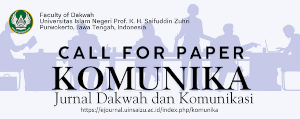PASANG SURUT HUBUNGAN ISLAM-BARAT
DOI:
https://doi.org/10.24090/komunika.v8i1.747Keywords:
Islam, West, relationship, culture, conflict.Abstract
This paper is a literature review (literature research) that uses John Esposito’s books as primary data sources and other figures’ statements about the relationship between Islam and the West as its secondary data source. The method of analyzing data used descriptive, interpretative, and analytical methods. The findings of this research are: first, based on historical fact, there is strong theological bond between Islam and the West, i.e. there are common ground and similarities between Islam and the West who inherited the Jewish and Christian traditions. These three religions inherited the tradition of Prophet Ibrahim. However, existing theological equation between Christianity and Islam became the cause of the collision between the two. Second, the historical problems between Islam and the West can be seen from the root of the conflicts, which include theological and political ones. Conflict between Islam and the West are covered with political motives. In contrast, religion is only used as a theological justification to culturally and theologically distinguish Islam and the West. Basically the difference is more driven by political interests. Third, as an effort to build a global coalition agreement, both sides should actively promote cooperation. Therefore, the most important thing is that the meet between Islam and the West should be interpreted as a civilization dialogue, not confrontation or distrust. the Building ideal relationship as well as the need for harmonization between Islam and Western civilization are also needed. ÂDownloads
Download data is not yet available.
References
Akbar S, Ahmed. 1997. Living Islam: Tamasya Budaya Menyusuri Samarkand hingga Atornoway. Bandung: Mizan.
Bakar, Osman. 2003. Islam dan Dialog Peradaban. Yogyakarta: Fajar Pustaka Baru.
Baso, Ahmad. 2005. Islam Pasca Kolonial. Bandung: Mizan.
Fazlurrahman Ansari. 2007. IslamÂBarat, dalam Benturan Barat dengan Islam. Haidar Bagir (Ed.). Bandung: Mizan.
Gerges, Fawaz A. 2002. Amerika dan Islam Politik: Benturan Peradaban atau Ben turan Kepentingan. Terj, Hamid Basyaib dan Kili Pringgodigdo. Jakarta: Alvabet.
Hanafi, Hassan. 2003. Cakrawala Baru Peradaban Global Revolusi Islam untuk Globalisme, Pluralisme dan Egalitarianisme antar Peradaban, Terj, Saiful Anam. Yogyakarta: Ircisod.
Hans Kueng dan Karl-Josef Kuschel. 2000. Etik Global (A Global Ethic: The Declaration of the Parliament of the World’s Religions), terj. Ahmad Murtajib. Yogyakarta: Pustaka Pelajar.
Huntington, Samuel P. 2000. Benturan Antar Peradaban, dan Masa Depan Politik Dunia. Terj. M. Sadat Ismail. Yogyakarta: Qalam.
Karim, Abdul M. 2007. Wacana Politik Islam Kontemporer. Yogyakarta: SUKA Press.
Lewis, Bernard. 2002. What Went Wrong? The Clash Between Islam and Modernity in the Middle East. Oxford University Press.
Madjid, Nurcholish. “Beberapa Renungan Tentang Kehidupan Keagamaan untuk Generasi Mendatang†dalam Ulumul Qur’an, Nomor I, Vol. IV, Tahun 1993.
Said, Edward W. 2003. Covering Islam, terj. Apri Danarno. Yogyakarta: Jendela.
Watt, William Montgomery. 1997. Fundamentalisme Islam dan Modernitas, Taufiq Adnan Amal (ed.). Jakarta: Raja Grafindo Persada.
Bakar, Osman. 2003. Islam dan Dialog Peradaban. Yogyakarta: Fajar Pustaka Baru.
Baso, Ahmad. 2005. Islam Pasca Kolonial. Bandung: Mizan.
Fazlurrahman Ansari. 2007. IslamÂBarat, dalam Benturan Barat dengan Islam. Haidar Bagir (Ed.). Bandung: Mizan.
Gerges, Fawaz A. 2002. Amerika dan Islam Politik: Benturan Peradaban atau Ben turan Kepentingan. Terj, Hamid Basyaib dan Kili Pringgodigdo. Jakarta: Alvabet.
Hanafi, Hassan. 2003. Cakrawala Baru Peradaban Global Revolusi Islam untuk Globalisme, Pluralisme dan Egalitarianisme antar Peradaban, Terj, Saiful Anam. Yogyakarta: Ircisod.
Hans Kueng dan Karl-Josef Kuschel. 2000. Etik Global (A Global Ethic: The Declaration of the Parliament of the World’s Religions), terj. Ahmad Murtajib. Yogyakarta: Pustaka Pelajar.
Huntington, Samuel P. 2000. Benturan Antar Peradaban, dan Masa Depan Politik Dunia. Terj. M. Sadat Ismail. Yogyakarta: Qalam.
Karim, Abdul M. 2007. Wacana Politik Islam Kontemporer. Yogyakarta: SUKA Press.
Lewis, Bernard. 2002. What Went Wrong? The Clash Between Islam and Modernity in the Middle East. Oxford University Press.
Madjid, Nurcholish. “Beberapa Renungan Tentang Kehidupan Keagamaan untuk Generasi Mendatang†dalam Ulumul Qur’an, Nomor I, Vol. IV, Tahun 1993.
Said, Edward W. 2003. Covering Islam, terj. Apri Danarno. Yogyakarta: Jendela.
Watt, William Montgomery. 1997. Fundamentalisme Islam dan Modernitas, Taufiq Adnan Amal (ed.). Jakarta: Raja Grafindo Persada.
Downloads
Issue
Section
Articles
License
Authors who publish with this journal agree to the following terms:
- Authors retain copyright and grant the journal right of first publication with the work simultaneously licensed under a Creative Commons Attribution-ShareAlike 4.0 International License that allows others to share the work with an acknowledgement of the work's authorship and initial publication in this journal.
- Authors are able to enter into separate, additional contractual arrangements for the non-exclusive distribution of the journal's published version of the work (e.g., post it to an institutional repository or publish it in a book), with an acknowledgement of its initial publication in this journal.
- Authors are permitted and encouraged to post their work online (e.g., in institutional repositories or on their website) prior to and during the submission process, as it can lead to productive exchanges, as well as earlier and greater citation of published work (See The Effect of Open Access).

























